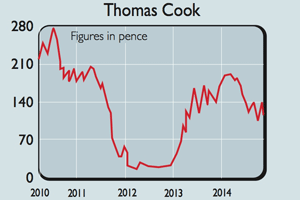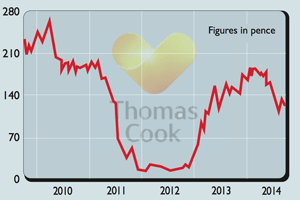What investors can learn from Thomas Cook's collapse
Bad decisions and bad debt have led to the collapse of 178-year-old travel company Thomas Cook. John Stepek looks at what investors can learn from its demise.

Get the latest financial news, insights and expert analysis from our award-winning MoneyWeek team, to help you understand what really matters when it comes to your finances.
You are now subscribed
Your newsletter sign-up was successful
Want to add more newsletters?

Twice daily
MoneyWeek
Get the latest financial news, insights and expert analysis from our award-winning MoneyWeek team, to help you understand what really matters when it comes to your finances.

Four times a week
Look After My Bills
Sign up to our free money-saving newsletter, filled with the latest news and expert advice to help you find the best tips and deals for managing your bills. Start saving today!

Britain's oldest travel company collapsed yesterday, after a long period on the ropes.
Thomas Cook was 178 years old. It could count Winston Churchill, Mark Twain, Rudyard Kipling, and Oscar Wilde among its (presumably satisfied) customers.
Now it is no more.
MoneyWeek
Subscribe to MoneyWeek today and get your first six magazine issues absolutely FREE

Sign up to Money Morning
Don't miss the latest investment and personal finances news, market analysis, plus money-saving tips with our free twice-daily newsletter
Don't miss the latest investment and personal finances news, market analysis, plus money-saving tips with our free twice-daily newsletter
So what went wrong? And what can investors learn from it?
Thomas Cook collapsed for two main reasons: bad decisions and debt
It's easy to assume that a package tour holiday company might be doomed in the era of the internet and the budget airline. But that particular brand of "disruption" has been around for decades now. So blaming "change" for Thomas Cook's collapse is simply mistaken.
Thomas Cook's collapse is primarily down to bad management decisions and taking on far too much debt. As the FT puts it, the woes that ultimately brought down the group "can be traced back to 2007".
That's when it merged with UK holiday company MyTravel (that same month, rival TUI merged with First Choice Holidays). In 2010, it then merged with Co-operative Travel, and inherited a load of high street travel agencies.
So not only was it loaded up with "legacy assets" which were losing value in an online era, it was also loaded up with debt about £1.7bn in total. In all, says Reuters, "it had to sell three million holidays a year just to cover its interest payments."
And this is in a tough, low-margin business, prone to "uncontrollable" external shocks such as surging oil prices, terrorist attacks, or any other sort of disaster that can render a country or region a "no-go" area for tourism for a prolonged period of time. In other words, you had an extremely fragile business operating in an extremely fragile business sector.
It warned on profits three times in 2011, and shed chief executive Manny Fontenla-Novoa (who oversaw the expansion era). Harriet Green took over, spent most of her time refinancing everything, then handed over to Peter Fankhauser. 2018 saw another two profit warnings, by which time it was clear that the group needed to take drastic action.
A rescue deal had been lined up Chinese group Fosun was going to inject a lot of money in return for taking over the majority of the tour operator (and a minority stake in the airline). The creditors (the banks and bondholders) would get the rest, converting their debt to equity.
But the banks looked at the company, and realised that it would need another £200m to see it through the winter. Already facing a big haircut, they didn't fancy putting in themselves. Fosun balked at it too. And so, the deal fell through.
You will see a lot of blame throwing for all of this, with "the banks" in particular coming in for stick. I am no defender of "banks" and they have been responsible for a lot of outrageous abuses of consumers and businesses over the decades.
But in this case, the broad truth is pretty simple: you had an immensely indebted company with a business model of uncertain value, that was at the mercy of its creditors. It couldn't come up with an appealing enough deal for them, and so it went to the wall.
Bear in mind that almost everyone with a stake in the company now stands to lose out that should tell you something about how unconvinced the creditors were about the company's recovery prospects.
We'll have more in the magazine this week about the implications for those who booked with Thomas Cook. It's a grim outcome for the 21,000 employees, very disappointing for people whose holidays have been cancelled at the last minute, and somewhat inconvenient (though less disastrous) for the 600,000-odd tourists left abroad (about 150,000 of whom are British and will have to be repatriated).
And it's bound to have a knock-on effect to a lot of suppliers in the resorts and regions where Thomas Cook was particularly dominant.
But this morning I just want to look at the lessons that investors can draw from this sorry outcome.
Three lessons for investors from Thomas Cook's collapse
First, debt is deadly. If you are an equity investor ie, a shareholder you must always remember that you are last in line to get paid. When an indebted company runs into trouble, it's the creditors who end up in charge and they only have so much patience.
An overload of debt forces managers to make choices that a company with a healthy balance sheet wouldn't make choices made out of a need to survive in the short term, rather than because it's the best long-term decision.
Different types of businesses have lower or higher tolerances for debt broadly speaking, the more predictable the revenues, the more sustainably indebted a company can afford to be.
But whatever stock you invest in, make sure you understand its entire debt position. How much does it owe? And to who? And what hidden liabilities does it have? What long-term commitments is it tied into that it can't break?
Secondly, low interest rates have created an environment in which troubled companies can limp on for longer. The holiday industry was suffering from over-capacity. The demise of Thomas Cook will help to clear a lot of that.
Which other industries are suffering from the same problems, and which companies will end up being the "zombies" that get taken out when creditors finally decide that enough is enough? And which of their rivals will benefit from that? Thomas Cook shareholders have had a miserable week, but anyone owning shares in its rival holiday groups and airlines had a good Monday morning.
Finally, brands are fantastic assets until they're not. A brand requires maintenance. You can't just build it and then expect it to stand there, a monument to the brilliance of the company, and a beacon to future customers for ever more. A company's brand has to keep on earning the love and respect of consumers.
A company with a "much-loved brand" which no longer invests in the things that the brand became "much-loved" for, is coasting. You can coast for a long time (Marks & Spencer is great proof of just how much ruin is in a brand). But eventually, you'll hit a wall.
So don't allow yourself to be distracted by a famous name. If it helps, imagine a company is called Acme Co, before you look at its accounts. It might help you to be objective.
For more on Thomas Cook's collapse and the implications for anyone who'd booked a flight or got stuck abroad check out this week's issue of MoneyWeek, out on Friday. (Get your first 12 issues for just £12 here).
Get the latest financial news, insights and expert analysis from our award-winning MoneyWeek team, to help you understand what really matters when it comes to your finances.

-
 Should you buy an active ETF?
Should you buy an active ETF?ETFs are often mischaracterised as passive products, but they can be a convenient way to add active management to your portfolio
-
 Power up your pension before 5 April – easy ways to save before the tax year end
Power up your pension before 5 April – easy ways to save before the tax year endWith the end of the tax year looming, pension savers currently have a window to review and maximise what’s going into their retirement funds – we look at how
-
 Why Thomas Cook collapsed
Why Thomas Cook collapsedFeatures Thomas Cook has gone bust, leaving stakeholders, politicians and managers all blaming each other.
-
 Thomas Cook’s holiday nightmare
Thomas Cook’s holiday nightmareFeatures High debt, fierce competition and one-off factors have pushed tour operator Thomas Cook to the brink of bankruptcy.
-
Share tips of the week
Features MoneyWeek’s comprehensive guide to the best of this week’s share tips from the rest of the UK's financial pages.
-
 Will Fosun rescue Thomas Cook?
Will Fosun rescue Thomas Cook?Features China’s Fosun International is considering bidding for beleaguered British travel company Thomas Cook’s tour operating division.
-
 Tips update: Thomas Cook
Tips update: Thomas CookFeatures Harriet Green's departure from Thomas Cook has rattled investors in the travel operator. But should it have, asks Phil Oakley.
-
 Shares in focus: Should you take a trip with Thomas Cook?
Shares in focus: Should you take a trip with Thomas Cook?Features Package-holiday provider Thomas Cook has done a good job of turning itself around. So, is it time to get back on board? Phil Oakley investigates.